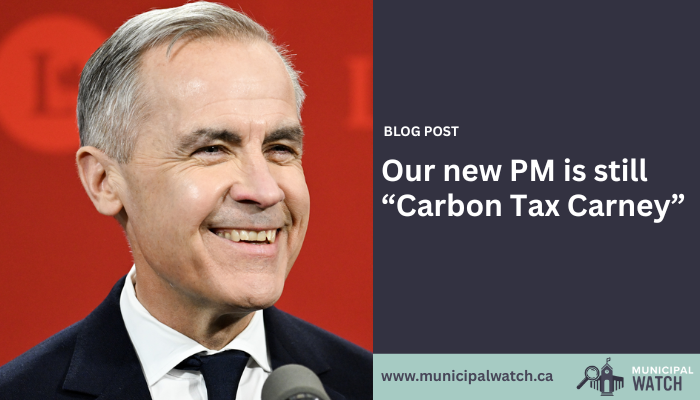Our new PM is still “Carbon Tax Carney”
With a week to go before the election, many Canadians have forgotten about the carbon tax. The hated Trudeau policy was an impediment to the newly minted Liberal leader Mark Carney’s electoral ambitions so he made it disappear, stating that it had “served a purpose up until now” but had become “divisive.” Translation: the tax was visible to voters, they were angry at having to pay it and might therefore decide to punish the Liberals at the ballot box on April 28th.
Certainly, Canadians were delighted by the consequent drop in gas prices, reflected at the pumps on the tenth day of the campaign.
In reality though, the carbon tax still exists.
Carney simply set the rate for consumer goods’ carbon taxation at zero, maintaining an industrial carbon tax (which we all pay but don’t see), and preserving the ability to crank up the consumer tax again at the first opportunity.
Notwithstanding the fact that carbon is not “pollution,” Carney and his team (virtually identical to the Justin Trudeau government) have been espousing the idea of carbon taxes as a “price on pollution” for quite some time, even going so far as to say we are “not going to get to where we need to be on climate change without a price that is significantly higher than where it is today.” Now, if it wasn’t high enough in 2019 at $20 per tonne (the last time the Liberals said they wouldn’t raise it, before doing so every year since), one can only assume that today’s rate of ZERO is most definitely not high enough for them.
Most beleaguered taxpayers in Canada were so pleased at the axe-the-tax “win” that they allowed Carney and the Liberals to get away with the shameless and hypocritical turnaround. And, of course, many are not even aware that the consumer tax can be raised again, that the industrial carbon tax remains firmly in place, and that several other hidden carbon taxes – like the clean fuel tax, the methane tax, and others – aren’t even mentioned.
Carney has been unequivocal in his answers to reporters on the campaign trail about whether he would scrap any of these. Of the industrial carbon tax, he said his Liberal government would keep it because it will create “a more efficient system.” Efficient, eh?
In a Globe & Mail op ed, BlackBerry billionaire Jim Balsillie called Carney a “more confident and efficient version of Justin Trudeau.” Well put. Carney’s belief system is so “efficient” that, in one interview, when he was asked if the consumer “price” is bad policy, he answered in the affirmative, because “policy has to have social licence” and Canadians “reasonably expect us to address climate change in a way that brings us together, not pushes us apart.” (Pre-politician Carney said that, without it, climate change would cause annual climate-related deaths on a scale comparable to the pandemic!)
Said slightly differently, if we can pull the wool over their gullible eyes with an opaque tax, those pesky taxpayers won’t be so darned angry about having to fork out the money.
Carney even went so far as to say that, going forward, “when you choose an energy efficient appliance or an electric car or home insulation, you will be rewarded and we will get the big polluters to pay for it.” He can’t seriously think we believe this nonsense.
Hidden carbon taxes are still there, just not in plain sight. Companies pass costs on to those who buy their products, otherwise they would go bankrupt and have to close down. So prices will keep going up for gasoline, groceries and everything else, you just won’t see why. Don’t be fooled by this brief, cleverly-timed-to-coincide-with-the-election-campaign reprieve, the next hit will be even harder. We won’t see it printed on receipts and bills of sale, it’ll be built-in to what Carney calls an “improved and tightened” (more efficient, perhaps?) system. He also plans to impose tariffs on foreign goods imported into Canada from countries that don’t have carbon taxes. We all know enough about tariffs by this time to understand that they will mean even higher prices still.
In addition to all of this, Carney has a huge plan for “incentives” (more Liberal double-speak for massive government spending) for green companies and green retail purchases, which spells even bigger trouble for Canada’s already heavy debt and deficit situation.
The relevance of all of this to our agenda at Municipal Watch? The Carney Government is setting the tone for more hidden big government spending of the kind we are trying to expose. His message is likely to be picked up by all those tax-obsessed municipal politicians across Canada who will adopt the tone and the approach – creating yet more expense for consumers. Efficient government? We wish.

